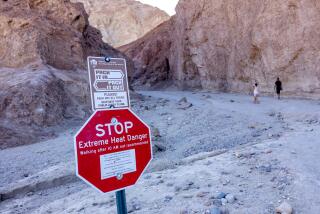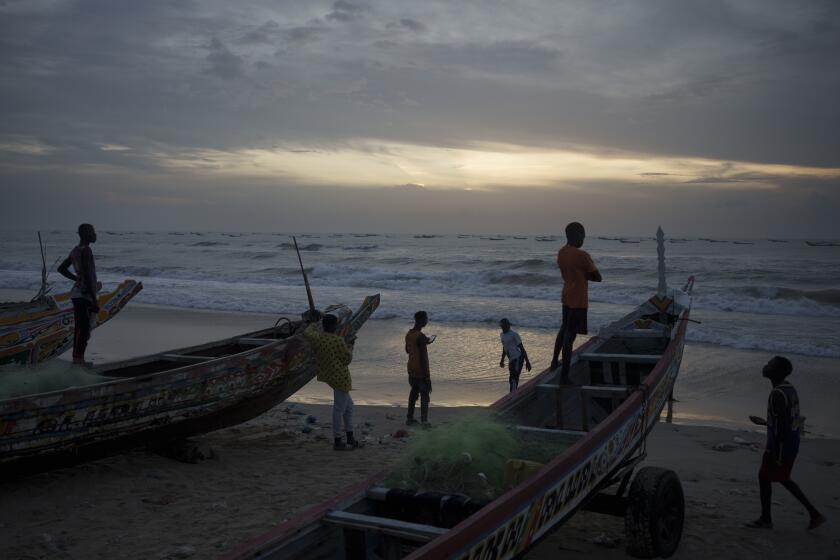Temperatures cool, but death toll tops 1,000 in Pakistani heat wave
The toll from the sweltering heat wave in Pakistan’s largest city continued to rise Thursday, surpassing more than 1,000 dead, according to state-run television, even as temperatures began to cool off.
The high temperature in Karachi was 100 degrees Fahrenheit, closer to seasonal averages and several degrees cooler than earlier in the week, as a sea breeze blew over the port city, officials said. The temperature had reached 113 degrees Sunday.
“The temperature will remain normal in the coming days,” said Ghulam Rasool, head of Pakistan’s government meteorological office.
The number of victims arriving at hospitals in the southern port city slowed considerably, although 35 bodies were received at morgues operated by the Edhi Welfare Organization, said the group’s spokesman, Anwar Kazmi.
It was the lowest number of bodies seen all week at the morgues, which received 750 heat stroke victims over the last five days, Kazmi said.
State-run broadcaster PTV put the death toll at over 1,000.
Many people in predominantly Muslim Pakistan are observing the holy month of Ramadan, which requires abstaining from food and water from dawn until dusk. Religious scholars have asked devotees to break the fast if they feel ill effects from the heat.
Pakistan’s deadliest heat wave on record comes just weeks after soaring temperatures caused nearly 2,200 deaths in neighboring India, raising fears that South Asia could be seeing some of the devastating effects of human-caused climate change.
The crisis centered in the southern port city of Karachi was worsened by poor local services, including a faulty power grid and shortages of potable water.
TV footage showed ambulances transporting heatstroke patients to hospitals, where people held small rallies against power outages, which had exacerbated the effects of the heat wave.
Observant Muslims, who make up the majority of Karachi’s 20 million residents, were meanwhile abstaining from food and water during long summer days. A single sip of water invalidates the fast, but Muslims are discouraged from fasting if they are sick or if doing so would cause physical harm.
Allama Tahir Ashrafi, a Pakistani cleric, called on sick and elderly people to avoid fasting until the weather improves.
“Those people who cannot fast because of health reasons should not fast these days. There is no need to risk your lives,” he said. Volunteers were meanwhile distributing clean drinking water and juice throughout the day.
TV footage showed women crying over the bodies of loved ones who had died because of the heat.
Syed Mannan Ahmed said his father collapsed Tuesday while going to buy groceries from a nearby shop. He said his family rushed the 64-year-old to a hospital but could not get treatment in time because it was packed with victims. Then they found that most of the mortuaries were full as well.
Another Karachi resident, Mohammad Ayaz, said hundreds of people were sleeping outside because of long power cuts. Wakil Ahmed said the weather had improved from previous days, when it was so hot it became difficult to breathe. He said Thursday brought clouds and a slight breeze.
While climate scientists can’t blame human-caused global warming for Pakistan’s heat wave without a time-consuming study, several said it fits with what is expected from climate change.
“The deadly heatwave that has killed several hundred people in Karachi, Pakistan is clearly a harbinger of things to come with the changing climate,” said Saleemul Huq, director of the International Center for Climate Change and Development in Bangladesh and a prominent climate scientist.
“Even if this particular event cannot be unequivocally attributed to human induced climate change, we can certainly expect such heat waves with greater frequency in future.”
Numerous studies over the past three years show that the number of prolonged heat waves has soared, and scientists have calculated that about three quarters of record heat is due to human-caused climate change.
“I would estimate that the likelihood for such a heat wave in Pakistan would have increased several-fold due to global warming,” said climate scientist Stefan Rahmstorf at the Potsdam Institute for Climate Research in Germany. “More likely than not, it would not have happened without global warming.”
Associated Press and Aoun Sahi for the Los Angeles Times
More to Read
Sign up for Essential California
The most important California stories and recommendations in your inbox every morning.
You may occasionally receive promotional content from the Los Angeles Times.










